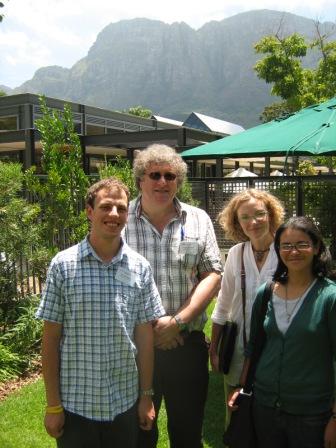
For members of Parliament (MPs), representing one’s constituency is a trickier task than you’d imagine. All MPs shuttle back and forth each week between Parliament and the areas in the country that they’re assigned to represent, their constituencies. And if our MPs are doing their job properly, they need to listen to the concerns of people in those constituencies, and then raise them in Parliament. The only trouble is that it takes quite a lot of strategic manoeuvring just to get a concern onto the parliamentary agenda, let alone see government act on that concern. Ian Siebörger and Ralph Adendorff explained the intricate linguistics of this process at a Departmental Research Seminar on Tuesday 19 April.
Ian and Ralph were delivering the paper that they presented in January at the Mobility Language Literacy conference in Cape Town. Ralph covered some of the basic concepts that they’ve used to understand what is going on in parliamentary committee meetings, and then Ian explained an example of two MPs who both brought up problems from their constituencies in a meeting of the Portfolio Committee on Transport.
The first MP, from the Democratic Alliance, an opposition party, told the committee about how his son who lived “on the other side of Soweto” had to spend hours each day travelling to school in dangerous minibus taxis due to a lack of reliable urban public transport systems. However, the point that he was trying to make through using this example was missed by the committee because he did not rephrase the problem in a way that made it relevant at a national scale.
The second MP, the committee’s chairperson from the African National Congress, talked about how in her poor rural hometown of Harding in southern KwaZulu / Natal, one often saw people being taken in wheelbarrows to collect their pensions because there was no reliable public transport systems. She skilfully managed to talk about this example in a way that showed that rural transport was a problem not only in Harding, but all over the country, and then give a challenge to the Department of Transport to improve the situation for people like those she was speaking about.
This research shows that MPs use examples from their constituencies to try to bolster their own political credibility, and that MPs need to use a whole variety of speech styles in clever ways to make sure that concerns from their constituencies are put onto Parliament’s agenda. They also need skill to negotiate the complicated power politics of parliamentary committee meetings. For representative democracy to work properly, MPs need to learn these skills, so that they can bring across concerns from their communities in an effective way.
